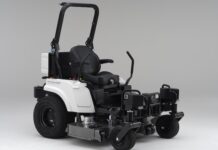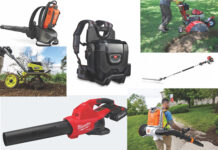 With noise abatement regulations in place in many municipalities and gaining traction across the country, landscape contractors are under pressure to ratchet down the decibels. Additionally, many contractors and communities are looking to create less disruption to the natural environments they live and work in, and sound is an important consideration in that equation.
With noise abatement regulations in place in many municipalities and gaining traction across the country, landscape contractors are under pressure to ratchet down the decibels. Additionally, many contractors and communities are looking to create less disruption to the natural environments they live and work in, and sound is an important consideration in that equation.
Research from the National Institute for Occupational Safety and Health shows sustained exposure to noises above 85 dB can increase the risk of noise induced hearing loss. The typical gas-powered mower operates at around 95 decibels (dB): the equivalent of a motorcycle roaring down the street.
As a result, switching to electric-powered equipment is not just about meeting regulations, but can provide better protections to landscape crews and create a safer, healthier working environment for them, points out Scythe Robotics, manufacturers of the M.52 autonomous electric mower.
At Scythe Robotics, patent-pending blades not only achieve higher efficiency, but reduce the mower’s noise profile when the blades are running. The lack of an internal combustion engine also makes the mower much quieter overall, even without blades spinning.
“For M.52, we have measured the sound intensity to be around 75 decibels – which is roughly equivalent to a passing car – at the operator,” said Rob McCutcheon, senior staff mechanical engineer for Scythe Robotics. “The lower intensity means that the operator can use the machine more comfortably and more effectively as it allows them to be more aware of their surroundings.”
In addition to decreased exposure to potentially harmful noise and vibration levels associated with traditional gas-powered mowers and equipment, electric equipment can provide additional benefits to landscape companies:
- An earlier start to the day. The lower sound intensity with electric equipment enables landscapers to schedule earlier starts and later stops when needed since you will not be disturbing people.
- With minimal noise disruption during the day, there is less impact for remote or home-based business clients. Some office parks and school campuses currently prefer to be serviced during off-hours or on weekends, but less sound invasive electric equipment may allow contractors to mow these properties during regular business hours.
- Contractors can also tout the increased safety of operation around pedestrians with electric equipment.
- Landscapers can submit job bids with the added benefit of saying they operate more quietly and sustainably than competing bids. Corporate procurement departments are placing more emphasis in the RFP process on sustainability and deploying emission-free electric equipment can be an advantage.
Read more from Scythe about Sound, Safety and Sustainability.
For more Turf coverage of battery-powered equipment, see:
- Gas Vs. Electric OPE: Real World Costs
- Creating Charging Infrastructure For OPE
- Charging Landscape Trailers
- Get Equipped: New Battery-Powered Landscaping Solutions 2023
- What’s In The Market For 2023?
Opening Photo Credit: Adobe Stock by auremar.











![[VIDEO] Dickies®: Discover Workwear That’s Anything But Uniform](https://turfmagazine.com/wp-content/uploads/2023/06/1647663814-4b1a2a7742790a9b1e97a3b963477850192e1d6a9dfba9b07214a77bae25d6e3-d-218x150.jpg)






























![[VIDEO] Dickies®: Discover Workwear That’s Anything But Uniform](https://turfmagazine.com/wp-content/uploads/2023/06/1647663814-4b1a2a7742790a9b1e97a3b963477850192e1d6a9dfba9b07214a77bae25d6e3-d-324x160.jpg)